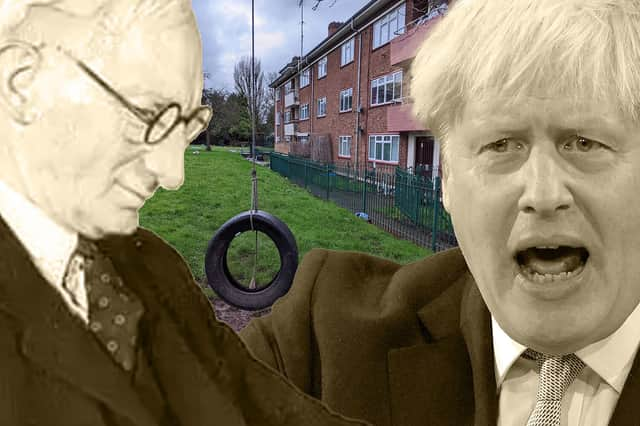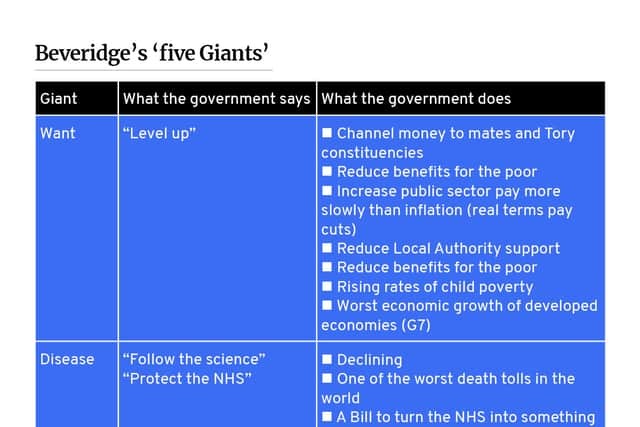William Beveridge’s ‘five giants’ - and how Boris Johnson’s actions fall short of his words on each


We talk a lot about the ‘social contract’ and how it is being undermined and dismantled by our current government, but do we really understand what it means?
Let’s take a look back at the social contract drafted by Beveridge and delivered by the government of Clement Attlee, and compare it with what Boris Johnson’s government is doing today.
What were Beveridge’s ‘five giants’?
Advertisement
Hide AdAdvertisement
Hide AdIn the middle of World War II, in 1942, the National Government of Great Britain commissioned Sir William Beveridge, the Director of the London School of Economics, to produce a report on the reconstruction of Britain after the war ended.
His report set out a blueprint for a better, fairer, more prosperous society, which would reward the nation for the shared sacrifices during the war.
Beveridge aimed to free Britain from what he called ‘Five Giants’:
- Want (poverty)
- Disease,
- Ignorance,
- Squalor and
- Idleness (unemployment)
The report was overwhelmingly popular with the public.


Johnson and his government have made similar promises, which have also been popular with the public.
Advertisement
Hide AdAdvertisement
Hide AdLet’s compare what Clement Attlee’s government delivered after the end of the war with what our government is delivering now.
Johnson’s government says the right things – but delivers the opposite
Johnson’s Government has made pledges relating to all five of Beveridge’s Giants. But they have not delivered.
First, Want. Ministers talk a lot about “levelling up,” but as this title previously reported, the levelling up fund is not being used to support the areas of greatest need but to channel money to Tory constituencies.
Pay and benefits have both failed to keep pace with inflation. poverty-at-end-of-2020-as-a-result-of-coronavirus-pandemic-finds-ippr">Child poverty is on the rise again. The nation as a whole has seen the weakest economic growth of all developed countries and the longest wage stagnation in over a century.
Advertisement
Hide AdAdvertisement
Hide AdSecond, Illness. Here there are two big issues: Covid and the NHS. On Covid they promised a world-beating response, doing all they can and following the science. What they have delivered is one of the worst death tolls in the world as well as one of the most damaged economies.
Only two governments in the world have performed worse both on Covid and on the economy – Peru and Argentina.
On the NHS they have promised huge investment and to solve the social care issue once and for all. What they have delivered is an underfunded system which would struggle even without Covid and a Bill to turn it into something rather like the US healthcare system – the worst in the developed world.
Third, Ignorance. Johnson speaks eloquently about the importance of education, but when it came to funding the government’s education Tsar’s recommended catch-up programme, the government slashed the budget by 90%.
Advertisement
Hide AdAdvertisement
Hide AdFourth, Squalor. The Government has repeatedly assured us that leaving the EU would not mean lowering standards and yet it has repeatedly signed trade deals which imply a lowering of food standards.
Most recently, 265 Tory MPs voted to allow water companies to pour sewage directly into inland waterways and coastal waters. The Budget, which is perhaps the clearest indication of what the government means to do, rather than just say, had woefully inadequate measures on environment.
Fifth, Idleness. The government has promised a green jobs revolution with highly paid jobs. But it is failing to deliver, and ‘proper jobs’ which offer security and a reasonable rate of pay are in short supply. Many people are now in in-work poverty.
To conclude, while what the government promises to do is both attractive and reasonable, what it actually does is almost the precise opposite.


Attlee’s government transformed the UK’s social contract
Advertisement
Hide AdAdvertisement
Hide AdAttlee’s government would have had plenty of excuses for non-delivery.
Government debt to GDP stood at over 250% at the end of the Second World War; the cost of servicing that debt was over 5% of GDP; more than half of national income had been diverted to the war effort and over 5 million people mobilised into the Armed Forces; some 5% of national wealth had been destroyed, and 1% of the population lost.
This was, of course, a far greater challenge than we face today.


But the national mood was different then. As Margaret McMillan, Professor of International History at Oxford University, explained: “The shared suffering and sacrifice of the war years strengthened the belief in most democracies that governments had an obligation to provide basic care for all citizens.”
Advertisement
Hide AdAdvertisement
Hide AdThat shared suffering and sacrifice may have been necessary to win the war. As evolutionary biologists David Sloan Wilson and Edward O Wilson put it: “Selfishness beats altruism within groups. Altruistic groups beat selfish groups. Everything else is commentary.”
Along with a mood of altruism and solidarity, there was one of hope. After six hard years, during the early part of which defeat seemed inevitable, the UK and its allies had emerged victorious. Even more than is usual after a war, the victors felt that good had triumphed over evil. Yes, there was a challenging task of reconstruction – but that was nothing compared with the challenges of the war itself.
The national mood then was one of hope and solidarity.
In 1948, when the ratio of government debt to GDP was still over 200%, the government founded the NHS. Also in 1948, it passed the National Assistance Act, which abolished the poor law system and established a social safety net to protect the poorest and most vulnerable, completing the work of the National Insurance Act of 1946.


The social contract in the UK was transformed. Everyone, whatever their background and current financial state had access to high-quality healthcare. Everyone had access to a safety net for times when things in their lives went wrong. Everyone played a part in building this new world. And the UK economy benefited hugely: the ‘Golden Age of Capitalism’ was the most successful period in the UK’s economic history.
Advertisement
Hide AdAdvertisement
Hide AdOf course, the UK is far richer now than it was in the immediate aftermath of World War II. Anything we could afford to do then, we can afford to do now, and more. We have been conditioned to believe that we cannot afford to act; but there is no factual basis for such claims of impotence.
If we dismantle the NHS and the welfare state, it is not because it is unaffordable: it is because we have made a political choice.
Or rather, our elected representatives have made that choice.
We should create a better, fairer, more prosperous UK
The UK is reeling from three crises – manufactured or magnified by government policy – Austerity, Brexit and Covid. The damage they have caused is, like WWII, enormous.
Advertisement
Hide AdAdvertisement
Hide AdLike the Attlee government’s response after WWII, our response should be ambitious. We should set out a new – stronger not weaker – social contract. We should have the courage to invest to build a better, fairer, greener and more prosperous UK.
As 99% commented in our analysis of the Budget:
“We should be aiming for a just, prosperous, democratic society in which everybody has the chance of a decent life. A society with secure, fairly paid jobs so that ordinary people have a reasonable expectation of being able to afford to buy themselves a flat or house. A society where people can count on being able to bring up children without fear of poverty. A society where access to healthcare is a right not a luxury. A society where the government accepts that it has responsibilities for the population as a whole and that collective action is often the only way to solve important problems (for example tackling the climate emergency or funding basic research with no immediate commercial application).
“A society, above all, where each new generation has a reasonable expectation of a better life than its predecessors.”
Sadly, none of this is happening under our current Government. This comparison shows that whereas Attlee delivered on his promises, Johnson is a man of words but not of deeds.
Advertisement
Hide AdAdvertisement
Hide AdMark E Thomas is the founder of 99% and author of 99%: Mass Impoverishment and How We Can End It. He has spent most of his career in business; for many years he ran the Strategy practice at PA Consulting Group. He is a Visiting Professor at IE Business School and has a degree in Mathematics from Cambridge University.
A message from the editor:
Thank you for reading. NationalWorld is a new national news brand, produced by a team of journalists, editors, video producers and designers who live and work across the UK. Find out more about who’s who in the team, and our editorial values. We want to start a community among our readers, so please follow us on Facebook, Twitter and Instagram, and keep the conversation going. You can also sign up to our email newsletters and get a curated selection of our best reads to your inbox every day.
Comment Guidelines
National World encourages reader discussion on our stories. User feedback, insights and back-and-forth exchanges add a rich layer of context to reporting. Please review our Community Guidelines before commenting.
